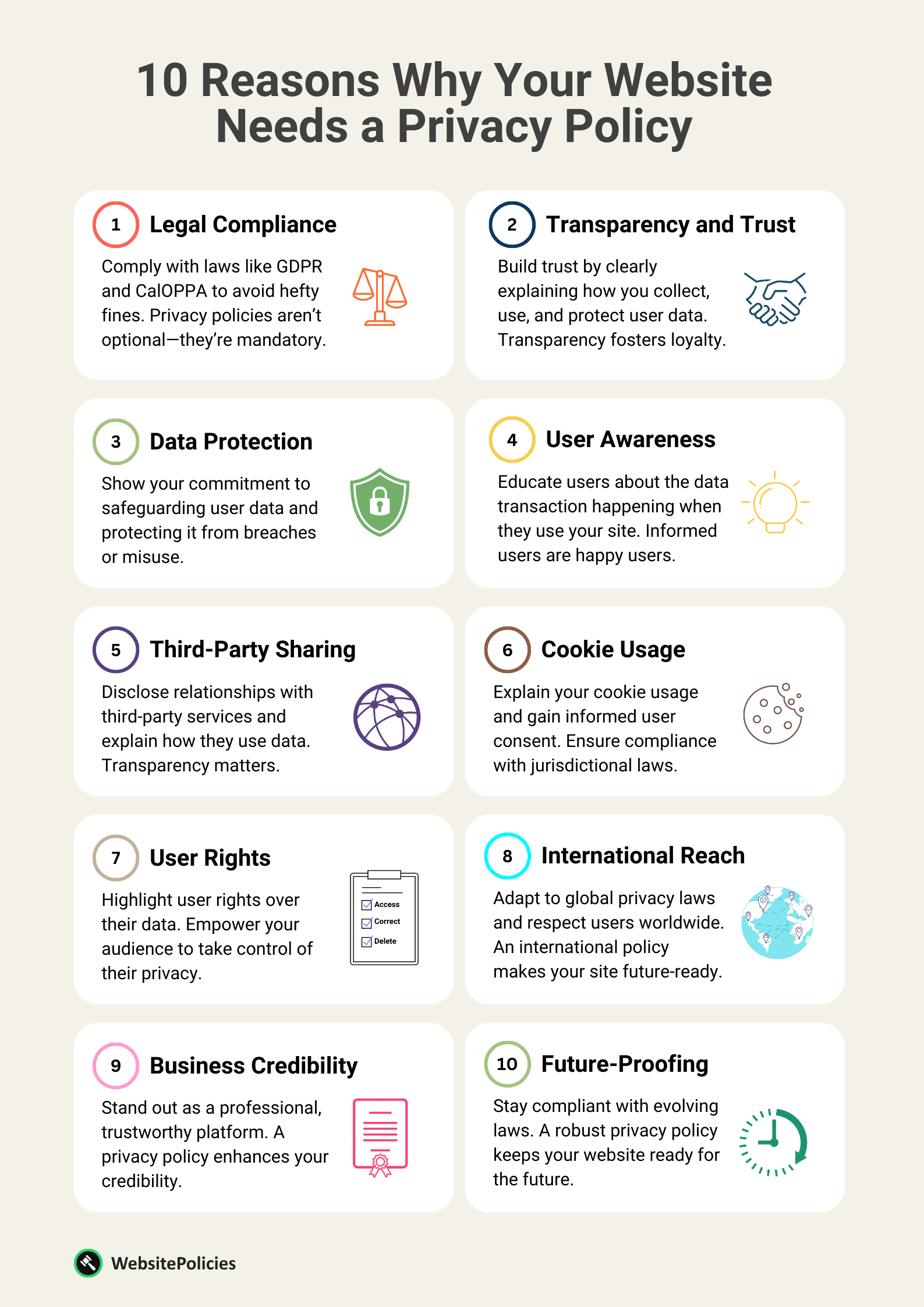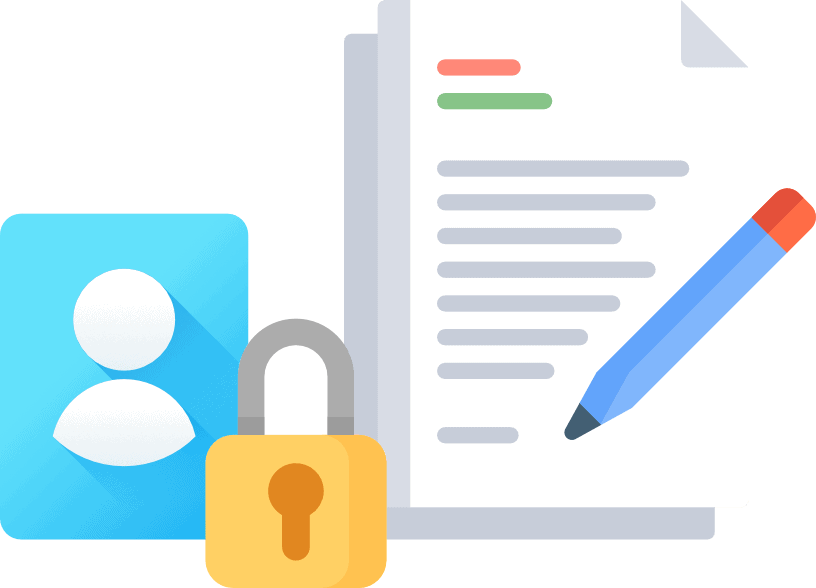So, you’ve got a website or maybe you’re planning on building one. Perhaps you’re selling cool stuff or just sharing your thoughts on your favorite books, movies, or even cheese.
Whatever it is, I bet there’s a question lurking in the back of your mind: Do I need a privacy policy for my website?
Let’s be upfront here – yes, you do. And that’s not just because I love talking about these things. There’s a whole host of reasons why a privacy policy is more essential than that morning cup of joe or that late-night slice of pizza you’ve been craving.
In this article, I’ll explain why you need a privacy policy, explore if you need one even if your website or app doesn’t collect any personal data, and look at what might happen if you decide to go rogue and skip the policy altogether.
- A privacy policy is legally required to comply with most modern laws, disclose data practices, protect user rights, demonstrate transparency, inform about third-party sharing, and more.
- Even if you don’t collect data directly, using third-party services on your website may involve data collection which means you must have a valid privacy policy in place to inform users about this and maintain compliance.
- Non-compliance can result in fines and lawsuits, as the laws aim to protect consumer rights and ensure transparency regarding data collection and usage.
Table of Contents
PRO TIP: Take the hassle of writing your own privacy policy away with our privacy policy generator trusted by over 200,000 businesses. It’ll save you hours of work and possible costly legal mistakes.
Why Do I Need a Privacy Policy On My Website?
There are many reasons why pretty much any website and mobile application must have a detailed privacy policy available. Here are 10 reasons why you shouldn’t take it lightly:

1. Legal Compliance
This isn’t a suggestion, it’s a requirement. Many jurisdictions, like the US and EU, have laws requiring websites to have a privacy policy.
The California Online Privacy Protection Act (CalOPPA), General Data Protection Regulation (GDPR), and Australia’s Privacy Act 1988 are just some examples.
These rules are designed to protect consumer rights by making sure companies are clear about what data they collect and how it’s used. Not complying with these laws can lead to hefty fines and lawsuits – not a party you’d want an invitation to.
2. Transparency and Trust
A privacy policy acts as a beacon of transparency, showcasing how you handle user data. By clearly stating the types of data you collect, the reasons for collection, and the means of protection, you create an environment of openness.
This can boost user confidence and encourage loyalty to your platform. Trust is a foundational pillar in any relationship, and it’s no different in the online world.
3. Data Protection
Your privacy policy doesn’t merely inform users about the data you collect – it also highlights your commitment to data protection. It underlines the measures you’ve put in place to safeguard user data from unauthorized access, alterations, or leaks.
By doing so, you assure users that their data is in safe hands, increasing their comfort in interacting with your platform.
PRO TIP: Data breaches happen more often than you may think so data protection is something you should pay utmost attention to. It’ll help you avoid dealing with all sorts of issues in the event something goes terribly wrong.
4. User Awareness
A privacy policy educates users about the data transaction taking place when they use your platform. It helps users make an informed decision about sharing their data and using your services.
By detailing what information you collect and why you need it, you offer users a clear understanding of how their data is used and how it benefits them.
5. Third-Party Sharing
Many websites share user data with third parties, like advertising networks or analytical tools. Your privacy policy is where you lay out all these relationships for your users to see. Not doing so would be like hosting a party and not telling your guests who else will be there.
But a privacy policy isn’t just about disclosing these third-party relationships.
It’s also about explaining how these third parties use the data and what they’re doing to protect it. It gives your users a full picture of who’s involved in processing their data and why.
6. Cookie Usage
Nearly all websites use cookies today. They’re like digital crumbs, helping you track users’ activities on your site. A privacy policy explains why you’re using cookies, what information they’re gathering, and how you’re using that data.
And of course, you cannot forget about consent. Many jurisdictions require you to obtain user consent before you can place cookies.
PRO TIP: A cookies section in your privacy policy can help you gain informed consent from your users, ensuring they know exactly what they’re agreeing to.
7. User Rights
Depending on where your users are located, they may have specific rights over their data. GDPR, for instance, gives users the right to access their data, correct inaccuracies, delete their data, and more.
Your privacy policy serves as a guide on how users can exercise these rights.
Remember, these rights aren’t just legal requirements – they’re also great customer service tools. By facilitating these rights, you’re showing your users that you value and respect their privacy.
8. International Reach
In the age of the internet, a business based in one country can easily serve customers around the globe. Different countries have different privacy laws, so your privacy policy needs to be a chameleon, adapting to all the different rules.
An internationally-compliant privacy policy shows your users that no matter where they’re from, you respect their privacy and adhere to their local laws.
9. Business Credibility
Having a privacy policy can help you portray a professional image. Just as dressing smartly for a business meeting can create a good impression, so can having a well-crafted privacy policy.
This professionalism can help set you apart from your competitors, especially in a world where consumers are increasingly concerned about their privacy.
It signals that you’re not just another website – you’re a trustworthy platform that values its users’ privacy.
10. Future-Proofing
Privacy norms and laws are evolving all the time. New rules can be introduced, and old ones can be updated, often with little warning.
Having a comprehensive privacy policy in place can help ensure that your website stays compliant no matter what changes come along.
PRO TIP: Don’t forget to review and update your privacy policy on a regular basis. Laws, regulations, and requirements change over time so you shouldn’t lag behind especially when it comes down to something as important as users’ privacy.
Are Privacy Policies Legally Required?
Yes, privacy policies are required by law. If you operate a website that collects personally identifiable information from users in jurisdictions with privacy laws like the GDPR in the EU, CCPA in California, or PDPA in Singapore, you are legally obligated to have a privacy policy.
Privacy laws often require websites to disclose what personal data they collect, why they collect it, how they use it, how they protect it, and who they share it with.
They also mandate websites to inform users about their rights over their data. Not having a privacy policy could lead to hefty fines, lawsuits, and reputational damage.
ALSO READ: Complete Guide to Privacy Policies
Do I Need a Privacy Policy If I Don’t Collect Any Data?
Yes, having a privacy policy on your website, even if you don’t collect any data, can still be beneficial for a few reasons.
Firstly, it demonstrates your commitment to transparency and shows users that you value their privacy, even if you don’t collect personal information. This can help build trust with your visitors.
Secondly, certain jurisdictions may have legal requirements for websites to have a privacy policy in place, regardless of whether data is collected. Adhering to these legal obligations can help you avoid potential legal issues.
Even if you don’t collect data directly, if you use third-party services on your website (such as analytics tools or advertising networks), those services may collect data.
In such cases, a privacy policy is necessary to inform users about the data collection and usage by these third parties, ensuring transparency and compliance.
If you’re certain you don’t collect any or much data, you may use a privacy policy template as a starting point and personalize it to suit your needs.
What Happens If I Don’t Have a Privacy Policy?
If you don’t have a privacy policy and you collect data from your users, you could face legal consequences, including fines, lawsuits, and damage to your reputation.
When you breach privacy laws, you’re not just risking monetary fines that can amount to thousands or even millions of dollars, you’re also risking the trust of your users.
If news gets out that you’re playing fast and loose with user data, you might see a drop in website traffic, sales, and customer trust. It’s not just about avoiding fines, it’s about maintaining a positive image and ensuring your business’s longevity.
Remember, a privacy policy is like a seatbelt for your website. It might seem cumbersome at first, but you’ll be thankful for it when things get rocky.
Frequently Asked Questions
Do I need a privacy policy for my website?
Yes, a privacy policy is legally required for websites and apps, especially those collecting personal data from users.
What are the benefits of having a privacy policy?
A privacy policy ensures legal compliance, builds trust with users, protects data, educates users, and enhances business credibility.
What happens if I don’t have a privacy policy?
Non-compliance can lead to legal consequences including fines, lawsuits, and damage to your reputation.
Do I need a privacy policy if I don’t collect any data?
Yes, even if you don’t collect data, third-party services on your site may do so. A privacy policy informs users about this.
How often should I update my privacy policy?
It’s a good idea to review and update your privacy policy at least once a year as laws and regulations change over time.



